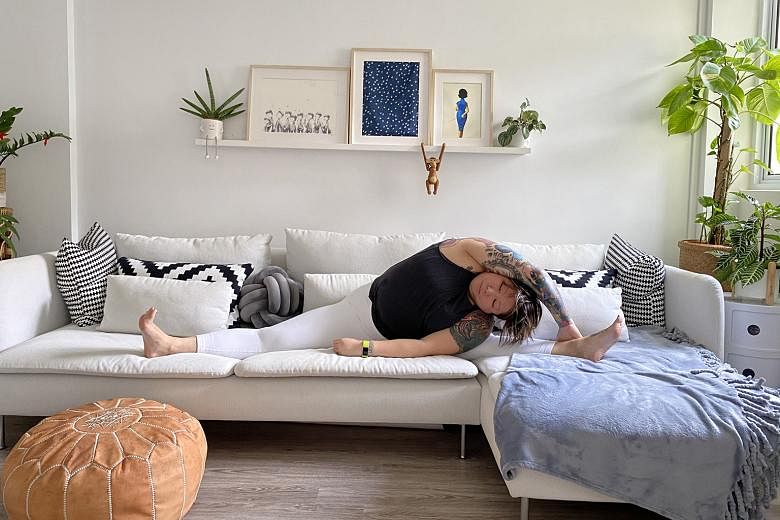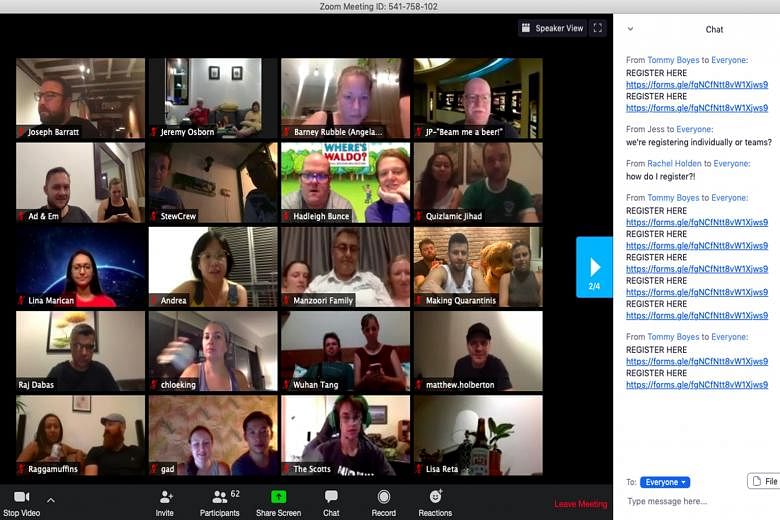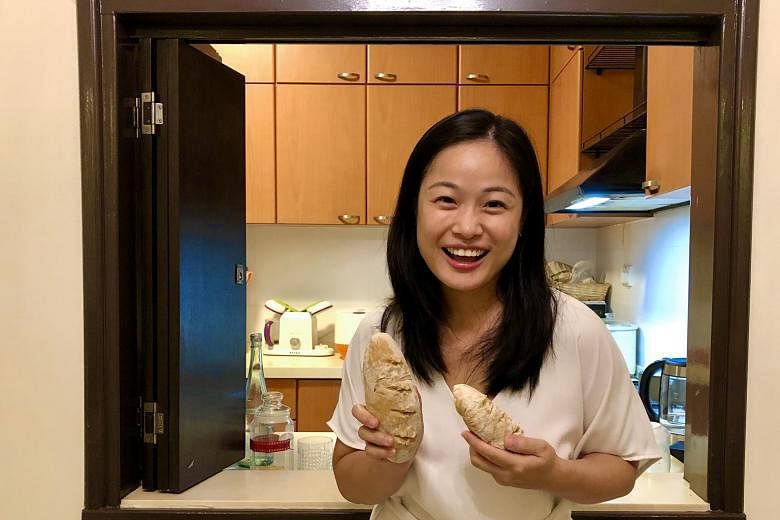E-PARTIES AND E-SLEEPOVERS
Miss your friends and family? You are not alone.
Mahjong sessions with kakis are now a no-go, with social contact strictly limited to household members. Gatherings to celebrate birthdays, housewarmings or baby's first month are also off the calendar.
However, many are still getting together, remotely, for milestone celebrations.
That was what happened on March 31, a day before retiree Bob Sim turned 70.
His daughter, Ms Angela Sim, and her cousins wanted to surprise him with a party, but settled for an e-party because social distancing measures had kicked in.
That evening, Ms Sim invited her sister-in-law over to Mr Sim's Bedok HDB flat for dinner. Just as he was sitting down to dinner, Ms Sim whipped out a laptop.
Waiting onscreen were 70 relatives and friends from Singapore and overseas, who had called in over Zoom. Her sister-in-law took out a cake, and everyone sang the birthday song.
During the evening, a PowerPoint presentation on his younger days as a scout, his career as a Singapore Airlines cabin crew, his hobbies such as sailing and memories that his friends and relatives have of him - was beamed.
Ms Sim, who is the managing director of Ence Marketing Group, says: "We didn't want our relatives and friends to miss this milestone."
"My dad was really surprised and touched. It was our family's first e-party and it was truly fun and memorable," she says.
With lockdowns in place worldwide currently, gatherings of family and friends are increasingly being held online.
On March 29, the family of Ms Illka Gobius, 52, an Australian public relations consultant based in Singapore, also held a two-hour family meeting over Zoom.
It involved 17 people - her parents, siblings, their spouses and children - across Australia and Singapore.
"We wanted the chance to tell one another how we were doing and that we love one another," she says.
Back in Singapore, a few friends, Ms Farrah Dewanti, Ms Tihani Shafie and Ms Iman Rudyshahan, celebrated two birthdays with an e-sleepover using Google Hangouts on March 27.
The 19-year-old students wanted to celebrate Ms Farrah and Ms Iman's birthdays over a hotpot meal and a sleepover, but Ms Farrah came down with tonsillitis and had to stay home. So they dressed up in their fanciest pyjamas and watched the horror movie Eerie (2018) together, using Netflix Party.
They kept a Google Hangouts video call on and chatted until they finally said goodnight at 2am.
Ms Farrah says: "I wasn't expecting much from it, but the e-sleepover ended up being pretty great. We vibed really well, even though we were just talking."
Benson Ang
LIVESTREAM AND VIDEO EXERCISE CLASSES
When circuit breaker measures kicked in earlier this week, Ms Elaine Heng upped the frequency of her spin sessions - from three times a week to every day.
She does the classes on a rented stationary bicycle in a five-room Housing Board flat where she lives with her husband and his family.
The 27-year-old is one of many gymgoers who have brought their workouts home.
Since last Tuesday, gyms and fitness studios have shut their doors in a month-long circuit breaker. They are among a list of non-essential businesses that must close until May 4.
Many yoga, barre, boxing and functional fitness studios quickly responded by uploading workout videos on their websites and social media channels to help members keep up with their fitness regimes from home.
Legacy Dance Co, for example, rushed to record videos over the last few days before the closures.
Absolute Cycle, the rhythm cycling studio that Ms Heng had joined for more than a year, rolled out a home package for students to rent bikes and spin along to prerecorded classes at home.
The brand, which runs three rhythm cycling studios in Singapore, launched the package at the end of last month.
Area manager Matthew John says it intended to rent out 60 bikes but increased this to 152 due to overwhelming demand.
A month-long package that includes delivery of the bike, shoes and dumbbells, as well as more than 30 pre-recorded classes a week, costs $790.
Ms Heng, who used to pay about $30 for each spin class she took in the studio, considers this good value.
"I like the flexibility of working out anytime. It is also a good opportunity for my family to try out spin," says Ms Heng, an influencer who also runs fashion brand Ilo the Label.
The rented bike introduced her two sisters-in-law, aged 27 and 30, to a spin class for the first time.
Although working out at home is undoubtedly more convenient, many say they miss the "community element" of group classes.
Ms Heng says: "In studio classes, everyone is very motivated. Even when you are tired and you want to give up, you will keep going because everyone is spinning along with you."
Ms Sherry Wong, 26, agrees. She has been attending classes at Legacy Dance Co thrice a week for the past four years. Now, she reckons she will likely practise less on her own. "
My friends are a big part of why I enjoy dance and I like the real-life interaction with instructors. I will still follow online tutorials at home, but perhaps just once or twice a week," says Ms Wong, a videographer at a travel start-up.
The studio's co-founder Chan Jia Jun, 31, says it launched livestream classes late last month, before switching to online video tutorials a week later.
Based on a poll, he estimates about 70 per cent of students would rather purchase video tutorials to do in their own time.
The studio has sold more than 200 online tutorials featuring styles such as K-pop, hip-hop and urban (a contemporary version of street dance). Each video costs $8.
As such, Mr Chan says one silver lining to studio closures is developing a new source of income that will hopefully continue once the coronavirus abates. Perhaps, he says, these can even reach overseas markets.
Mobility instructor Amanda Koh, 41, who teaches yoga and pilates at Fitness First as well as private classes at her home studio, also uses virtual classes to connect with international students.
She launched the classes about six weeks ago.
Ms Koh, who has taught at yoga festivals in Bali, Perth and Malaysia, has had many overseas students request for virtual classes.
Covid-19 was the push she needed to get them up and running. Teaching over video conferencing app Zoom proved both interactive and efficient.
"I thought I would feel weird, like I was talking to my phone. But I can hear the students fumbling around. There is still the regular back and forth that you experience as a teacher," says Ms Koh.
The grid view lets her keep track of how students are doing, zoom in on specific areas and give feedback.
She adds that response has been good - she has 10 to 47 participants in each virtual class.
She plans to hold at least eight classes a week for the rest of the month.
Ms Mariette Ong, 46, head of community service at School of the Arts Singapore, has been attending Ms Koh's classes at Fitness First thrice a week for the past three years.
She has since attended four of her virtual classes and finds them a good alternative.
"I like how Amanda translates the proper form from in-person to a Zoom class," says Ms Ong.
But it remains to be seen if students' zest for home workouts will continue as the month grinds on.
Ms Koh likens it to the surge in gym sign-ups at the start of each year, when people are more driven to set and fulfil resolutions.
Mr Chan of Legacy Dance Co says: "We will need time to build a following for our online classes. We see the potential, but it takes time for our students to build a new habit."
Clara Lock
E-CLUBBING AND ONLINE PUB QUIZZES
It is 8pm on April 1 and Trouble Brewing, a local craft beer brewery, is hosting a quarantine quiz night.
Wait, aren't all entertainment venues supposed to be closed? Yes, they are.
The quiz night is conducted online, with about 65 participants - customers and friends - safely in their homes.
With circuit breaker measures introduced to minimise the spread of Covid-19, many aspects of life - from leisure, business and family gatherings - have undergone a sea change in recent weeks.
Trouble Brewing's online quiz, for example, was conducted over Zoom, with brand ambassador Tommy Boyes, 37, energetically hosting the two-hour quiz from the brewery's office in Craig Road.
"Who won the first American Idol competition?" he hollers on a live chat. "What is British singer Adele's surname?"
Participants type out the answers on their e-forms and submit them. He then reads out the correct answers - Kelly Clarkson and Adkins. The grand prize is awarded: a case of beer.
Trouble Brewing's founder and chief executive officer, Mr Joseph Barratt, 35, says: "Our first virtual quiz night went really well and we are turning this into a weekly activity.
"This pandemic is hard on businesses and individuals alike and we are just grateful that we are able to continue giving our customers something fun to look forward to during the circuit breaker period."
One of those who took part in the quiz is Ms Lina Marican, 35, managing director of Mutant Communications.
The Singaporean says: "It was my first time taking part in a pub quiz, let alone an online one, and I did not expect it to be so fun and lively.
"Everyone was engaged and the online quiz felt like a true bonding experience."
Another participant, events director Andrea Koh, 39, says: "I am definitely looking forward to getting back to physical human interaction after the Covid-19 situation blows over, but virtual hangouts like these can tide me over in the meantime."
Now that all entertainment venues are shut, a merry night of drinks and dancing has taken on a new form, at least for some partygoers.
Students Chloe Seow and Nadia Lim, both 19, and Alexandra Khorvat, 21, used to go clubbing at places like Yang club and Get Juiced in Clarke Quay.
But on March 30, they went "eclubbing" for 30 minutes, dancing in front of their laptops with the Skype app on.
"I was talking to my friends on Skype while we were watching the drama Money Heist, when the song Bella Ciao came on," Ms Lim recounts.
"So Alex, who misses clubbing the most, grabbed a bottle of rose wine and just started dancing. After the song ended, we played more music to help keep us in the clubbing mood."
E-clubbing cannot match clubbing in person, she acknowledges.
"There is something about being at the location, feeling music pound in your ears, and being able to see your friends dancing around you. But at least e-clubbing lets us see one another."
And although dance classes have been put on hold, others are still getting their groove on.
Student Jaanvi Agarwal, 19, for instance, took part in an e-Bollywood dance class over Zoom on April 6 with choreographer Anil Dandge from Dance Bollywood International, which has two studios in Singapore.
She says: "The nine or 10 people I usually dance with were also in the e-class. On the whole, I liked that it was convenient, since I did not have to leave my house to take part in the class."
Benson Ang and Chelsea Kiew
VIRTUAL WATER COOLER BREAKS
With most workplaces closed and employees asked to stay home, banter-and-gossip sessions at the water cooler are now a thing of the past.
With workers ensconced at home, companies are turning to the Internet to facilitate bonding and staying in touch.
At Google's Asia-Pacific headquarters, which is located in Singapore, staff, known as "Googlers", are leading the way in replicating the experience of kicking back with colleagues on fun, non-work matters.
They are encouraged to share recipes, parenting tips, wellness resources and DIY ideas on Google Meet, a video-conferencing platform.
Since March 18, Googler 2 Googler classes, a weekly event where Google employees take turns to teach one another a skill or topic they are passionate about during office hours, have been taken online.
One such class on March 30 featured Ms Queena Do, Google's partner development lead for Southeast Asia, teaching her colleagues how to bake baguettes.
The 33-year-old Vietnamese, who has been working in Singapore for 13 years, showed the various stages of mixing, kneading and proofing the French loaf from her home kitchen. About 30 Googlers attended the one-hour session over Google Meet.
She says: "I wanted to debunk the notion that baguettes are difficult to make and, through demonstrating the different processes, show that they, too, can do it, with a little bit of effort.
"I did not expect people to have so many questions, which they typed in through Google Meet.
"It was challenging to respond to queries while demonstrating the steps, but another colleague on the call helped read out the questions so I could answer them."
Googlers have also been organising virtual lunches, TGIF drinks and coffee chats with one another. Google's Asia-Pacific communications team holds a casual coffee chat for teammates twice a week to catch up and stay connected.
It is not the only company leveraging on technology to keep spirits up and adapt to new working arrangements.
Staff at DBS Bank, for example, have been working from home, or from split offices, since early February.
To keep morale high, DBS employees have come up with new team rituals using video-conferencing platforms.
For instance, one department holds weekly Fast Food Fridays, where colleagues share their lunch virtually and catch up with one another.
Other teams have regular virtual book clubs for employees to connect outside of work conversations, while encouraging continuous learning.
Ms Soh Siew Choo, DBS' group head of consumer banking, big data and analytics technology, says her team threw a virtual appreciation party via video conference to celebrate its "can-do spirit" on April 3, featuring a musical performance and chair yoga exercises.
"We even had a few colleagues give us a virtual tour of their homes," she says.
The Improv Company, Singapore's biggest improvised theatre company and training centre, is also trying to make the best of the current situation.
Although it has cancelled all performances and courses at its South Bridge Road studio until next month, it has organised seven practices for its improvisers via Zoom so far.
Five to eight people attend each session, which lasts about two hours, during which they sharpen their skills, create characters and craft dialogue.
The company's artistic director, Mr Kim Tan, 35, says doing improv over Zoom presents significant challenges.
"Improv is a theatrical form and the limited use of our physicality gets in the way. If participants have poor audio-visual gear or Internet connections, there is a lot of lag, which can interfere with the immediacy of our responses.
"It is also tiring to focus for long when you are on the computer and at home. People get distracted very easily."
Outside of companies, individuals are also turning to online platforms for camaraderie.
Ms Mok Cui Yin, a Singaporean independent producer, has organised four Work From Home: Alone, Together sessions, where two to eight people in different locations turn on Zoom and work together in a "shared digital space".
So far, people have tuned in from Japan, New Zealand, Vietnam and Singapore, and the sessions have lasted from two to five hours.
The 31-year-old says: "During the sessions, we sometimes chat. Other times, we just work in silence. It is a bit like a virtual co-working space or cafe where people drop in and out.
"Organising these sessions is a small way for me to help people at home, who might struggle to get work done without social or human interaction."
Benson Ang





